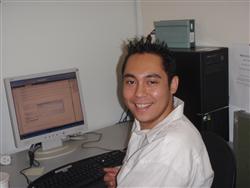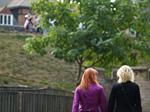Study Creative Writing at Home
-
Develop Creativity, Develop Writing Skills, Explore your Potential.
-
Learn how to write engaging fiction and non-fiction text.
-
Learn how to structure your writing.
-
Develop and hone your general writing skills.
 This course is a good starting point for you to learn to write professionally. It is equally valuable to help improve your general communication skills and develop a more creative and interesting approach to writing in everyday life, whether writing letters to friends or putting together community newsletters.
This course is a good starting point for you to learn to write professionally. It is equally valuable to help improve your general communication skills and develop a more creative and interesting approach to writing in everyday life, whether writing letters to friends or putting together community newsletters.
In this course, ‘creative writing’ is any writing that expresses events and emotions in an imaginative manner and whose primary intent is to arouse emotions. Creative writing can therefore be fiction, using imaginative narration, or non-fiction, based on facts and events. The common ground of fiction and non-fiction writing is the creativity the writer uses to express his or her thoughts and emotions.
Suitable For
This course is suitable for the complete beginner to someone who already writes but is looking to improve their writing skills. You will study with the full guidance and support of our specialist tutors.
Course Duration: 100 hours.
Course Structure and Content
The nine lessons are as outlined below:
-
Introduction
-
 What is creative writing
What is creative writing
-
What’s different about creative writing
-
Information and creativity
-
Creative genres
-
Forms of Writing
-
Form
-
Structure
-
Purpose
-
Creative Writing resources
-
What is needed for success
-
The business of writing
-
Getting published
-
Self publishing
-
Vanity publishing
-
Terminology.

Basic Creative Writing Skills
-
Words and their proper use
-
Types of language
-
Informative language
-
Persuasive language
-
Imaginative language
-
Literal language
-
Figurative language
-
Formal language
-
Colloquial language
-
Parts of language (nouns, pronouns, verbs, adverbs, prepositions, plurals, possessive nouns & pronouns, gender, adjectives, articles)
-
Common grammatical errors (fragmented sentences, run on sentences, comma splices, dangling modifiers).
-
Run on sentences
-
Irregular verbs
-
Whom or who
-
Pronouns and Antecedents
-
Punctuation
-
Creating and critiquing
-
Generating ideas
-
Developing ideas
-
Narrative theory
-
Storyline
-
Narrative structure
-
Settings or scenes
-
Mood or atmosphere
-
Time
-
Voice

Point of view
-
Creative reading.
-
Conciseness and Clarity
-
Planning What You Write
-
Writing routine
-
Establishing a theme
-
Organising ideas
-
Paragraphing
-
Writing a synopsis
-
Titles
-
Developing objectives.
-
Writing Fiction
- Elements
-
Clues
-
Signs
-
Common errors
-
Scope or Range
-
Theme problems
-
Authenticity problems
-
Tone problems.
-
Writing Non-fiction
-
Newspaper Writing
-
What to write
-
Scope
-
News values
-
Writing guidelines
-
Regular columns
-
Fillers.
-
Writing for Magazines
-
Writing Books
-
Themes
-
Consistency
-
Believability
-
Variety
-
Getting started
-
Getting a contract
-
Book publishing
-
Non fiction books
-
Fact finding.
-
Special Project
What You Will Do In This Course
Some of the activities and exercises that you will do as part of this course are:
-
Analyse three texts to identify their genres, describe their layout, and any key elements.
-
Locate a vanity publisher and a well-known publisher and obtain information on their submitting requirements.
-
Write part of a newspaper feature article in 3 different ways, using 3 different types of language to create different impressions.
-
Critique a piece of your own writing (250 words or more), noting its good points, its weaknesses.
-
Develop one short scene for three different story lines, letting the setting, characters, dialogue and action show what is happening, what might have gone before, and what might follow.
-
Make notes on two authors’ uses of concealing and revealing (transparency and ambiguity), and analyse their effectiveness in each case.
-
Describe a place or person in your life from two completely different perspectives.
-
Rewrite an assignment in a different voice.
-
Use defamiliarisation to make a common object appear mysterious, or dangerous, or alien.
-
Discuss the organisation of texts, considering why the authors might have organised their texts this way, and discuss how the structures contribute to the overall effectiveness of the text.
-
Write a first draft in 3 hours, without editing.
-
Edit the draft for structure, clarity, flow of ideas, content, mood, voice etc.
-
Edit 3 items of your writing (include one short story) for clarity and succinctness; explain your changes.
-
Research likely publishers for one of your stories and submit it.
-
Construct outlines of fiction stories using the first and last sentences of published works.
-
List 3 possible non-fiction writing projects for specific publishers, and explain your choices.
-
Write three outlines for non-fiction pieces, modelled on the outlines of your three creative writing readings.
-
Interview someone in preparation for writing a profile on that person. Explain why you think that person might be of interest to others.
Professional writers mark and comment on your work throughout the course, giving you invaluable advice and guidance. For those wanting to go further, the tutors are more than happy to advise you on how to get started into a career in writing; how to develop your work, how to approach people who might buy it and how to deal with such people.
Creative Writing can be either Fiction or Non Fiction
Differences between creative and informative writing are sometimes quite blurred. Some well-known and esteemed pieces of writing that are primarily informative are also very creative, sensitive and beautiful, while some primarily creative works are also highly informative. To understand this better, read a chapter from A.S. Byatt’s novel, Possession, Tolstoy’s War and Peace, Dee Brown’s history, Bury My Heart at Wounded Knee, and James Mitchener’s epic novel, Hawaii. You will also see writing where creativity and information carry equal weight and importance in some newspaper feature articles, often found in the centre pages of the weekend editions, and in many magazine articles.
Good creative writing uses the same kinds of writing that make for good informative writing, or good argument, or good exposition. It is the writer’s skill at using these forms of writing that can turn any piece of writing into creative piece of writing.
Even when we write fiction, we are dealing with reality as we know it. Fictional does not mean false. It takes our reality, or parts of it, and shows it to us in new ways. It makes the familiar unfamiliar, and takes us into parts of reality, making us take the time (because we read much slower than we think or see) to see its complexity, beauty and pain. Even fantasy fiction and science fiction, which give us totally created worlds, are based on elements of reality, and are therefore recognisable and believable. Therefore, when we write creatively, it doesn't matter whether we are writing fiction or non-fiction. What matters is that we are sharing experiences and emotions with the reader and, for a while at least, leading them towards a particular point of view.
Our Services
On enrolment, you are sent a package of course materials including:
- A Subject Guide with lesson notes;
- Interactive self assessment tests
You will also gain access to intensive tutor support. Tutors are available five days a week and can be contacted by email, phone, or in writing. Arrangements can be made for tutors to contact you after hours, if needed.
Student Comment
"I'm a part of (www.faithwriters.com) I put up a message singing the praises of the creative writing course offered by ACS."
Suzanne, Creative Writing student
Enrol Today
If you want to become a writer or want to hone your existing skills to become better, why not enrol today?
If you would like to know more -
Contact us today, by
Phone: (International) +61 7 5562 1088 or (in Australia) 07 5562 1088
Email: admin@acs.edu.au
Use our FREE COURSE COUNSELLING SERVICE.